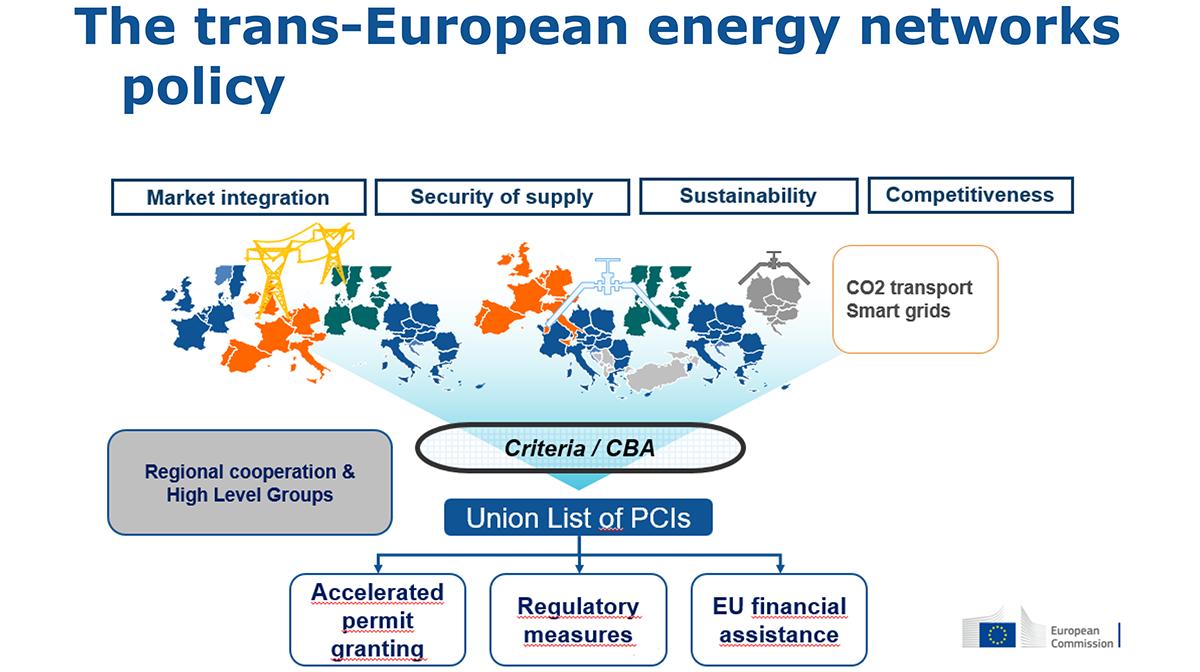
Implementing the new TEN-E Regulation
Following the need to reflect on developments in the priorities of European energy policy, the European Commission started to work on a revised TEN-E framework in 2020. This resulted in the adoption of Regulation (EU) 2022/869 on guidelines for trans-European energy infrastructure (new TEN-E), repealing the old Regulation 347/2013 in June 2022.

Source: European Commission - Webinar: The revised TEN-E Regulation, 10 May 2022
In the Energy Community context, the TEN-E Regulation 347/2013 was incorporated into the acquis in October 2015. The follow-up TEN-E Regulation was adopted and adapted with Ministerial Council Decisions 2023/02/MC-EnC and 2023/03/MC-EnC in December 2023. Upon its entry into force it will repeal the old regulation on 31 December 2024.
2022 - 2024 TEN-E Regulation implementation roadmap
The revised TEN-E Regulation adopted at EU level
Read moreDiscussion and exchange of views between DG Energy and the Energy Community Secretariat.
Deadline for European Commision's final proposal
With Decisions 2023/02/MC-EnC and 2023/03/MC-EnC, the 21st Ministerial Council adopts and adapts the TEN-E Regulation.
New PECI project selection process begins
The new PECI list of projects tabled for the decision of the 22nd Ministerial Council
31.12.2024: TEN-E Regulation transposition deadline, repealing the old TEN-E Regulation 347/2013
TEN-E Regulation - changes and support provided
-
New TEN-E Regulation and changes
What will change with the adoption of the TEN-E Regulation?
At the EU level, the main differences regarding revised (new) and original (old) TEN-E Regulation are:
- European Union list of projects of common interest (PCI) has been expanded with the projects of mutual interest (PMI, infrastructural project between at least one EU country and at least one "third" country), which are now excluded from the Energy Community selection process.
- Project categories eligible for support have been changed:
- natural gas and oil being excluded,
- offshore grids, hydrogen, electrolysers and smart gas grids being included
- at the Energy Community level also carbon dioxide transport and storage projects are included;
- Eligibility criteria for smart electricity grid projects have been relaxed;
- Eligibility criteria for hydrogen, electrolysers and smart gas grids have been defined;
- Eligibility of projects for European Union financial assistance has been set up,
- In case of the EU this includes PMI projects under specific circumstances and pumped-storage hydropower plants (previously not eligible), but excluding electrolysers
- At the Energy Community level, this includes possible Union technical and financial assistance from the Instrument of Pre-Accession Assistance, the Neighbourhood Development and International Cooperation Instrument and the Ukraine Facility);
-
Secretariat's role
How does the Secretariat support the implementation process?
Timeline Description Q3-Q4/2022
Analysis of the new Regulation, internal discussions;
Q1//2023
European Commission and Energy Community discussion on implementation and timing; Q2-Q3/2023 Coordination with the European Commission, organisation of workshops, discussions with the Contracting Parties if requested; Q4/2023 After Ministerial Council decision on the adoption of the TEN-Regulation 2022/869, preparation of the PECI selection process in 2024; Q1-Q2/2024
New PECI selection process, coordination of the groups, a proposal of the list of projects of Energy Community interest;
Q4/2024
Support for the Ministerial Council to adopt the list;
Q1/2025 and afterwards
Monitoring of the implementation, support to the Contracting Parties, organisation of the process, coordination of the groups, and, preparation of proposals for the new Energy Community PECI list (every two years).
-
ECRB Statement on good practices
ECRB Statement on good practices for the treatment of investment requests
Article 16 of the revised TEN-E Regulation, as adopted in the Energy Community, defines that the Energy Community Regulatory Board shall adopt a recommendation for identifying good practices for the treatment of investment requests for projects of Energy Community interest by 24 June 2024.
As soon as such a project of Energy Community interest has reached sufficient maturity, and is estimated to be ready to start the construction phase within the next 36 months, the project promoters, after having consulted the TSOs from the Contracting Parties which receive a significant net positive impact from it, shall submit an investment request. That investment request shall include a request for a cross-border cost allocation and shall be submitted to all the relevant national regulatory authorities concerned.
Filters:
Document Name Published on 24.06.2024
TEN-E (PECI) Groups and the selection process
Following the adoption of the revised TEN-E Regulation in the Energy Community in December 2023, a new selection process for PECI projects started in February 2024. The process is expected to be finished by autumn 2024 and will result in a preliminary list of Projects of Energy Community (PECI) interest. The list will be tabled for approval at the Ministerial Council meeting in December 2024.
The selection process was kicked off with a call for project nominations. All nominated projects will undergo thorough pre-selection and evaluation, guided by the criteria outlined in the revised TEN-E Regulation. This criteria is written down in Article 4, including Annexes II and IV.
The nominated projects will be evaluated by two Groups, consisting of representatives of the Contracting Party ministries and national regulatory authorities, gas and electricity transmission system operators, the European Commission, the Secretariat, the Energy Community Regulatory Board, the ECDSO-E entity, the European Network of Transmission System Operators for electricity or gas.
